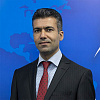U.S. President Joe Biden's decision to appoint Brett McGurk as coordinator for the Middle East and North Africa to his team at the National Security Council remind one the circumstances and atmosphere that accompanied his "early" resignation when he was the U.S. special presidential envoy for the global coalition against "ISIS" in late 2018, when he protested the decision to withdraw U.S. forces from Syria.
Former President Donald Trump commented on McGurk's resignation, “Brett McGurk, who I do not know, was appointed by President Obama in 2015. Was supposed to leave in February but he just resigned prior to leaving. Grandstander? The Fake News is making such a big deal about this nothing event!” and a senior Trump administration official described McGurk as "the architect of the failed agreement that Obama reached with Iran."
Trump's unexpected decision to withdraw his forces from Syria in late 2018 raised many questions, although it was not the first time that he referred to this withdrawal, as he had previously spoken about it during his election campaign and repeated his position in a tweet on "Twitter" months before the decision was made.
It is no secret to anyone that there was no indication that Washington was working on an exit strategy from Syria, until the time of the withdrawal decision, while Trump justified it by defeating ISIS.
But there are other reasons for the U.S. military presence in Syria, which the Americans themselves have previously talked about. These include confronting Iran, breaking its influence and protecting Israel, in addition to the issue of the balance of power with Russia. It is no secret that over the past years, we have not witnessed any American move to confront Tehran within the Syrian situation. Rather, Israel alone targets some Iranian sites inside Syria from time to time.
In an interview with Reuters, Silo, the former spokesman of the SDF, indicated that the American envoy, Brett McGurk, was very influential from the beginning. When talking about liberating Manbij, he suggested establishing a military council for the city, the majority of which were Arabs, to convince the Turkish side. In this way, an impression was created among the Turks that the people of Manbij are the ones who liberated the city, and we saw the same picture in Raqqa. When he was presenting the proposals, he emphasized the necessity to create an image that Arabs are on the ground.
In the same context, Amnesty International Organization said that, in a report issued in late 2015, its fact-finding mission in northern Syria revealed a wave of forced displacement and home demolitions. These amounted to war crimes carried out by the Autonomous Administration led by the Democratic Union Party, the Syrian Kurdish party which controls the area.
The report reveals evidence of horrific violations, including eyewitness and satellite images, and provides details of the deliberate displacement of thousands of civilians as well as the destruction of entire villages in areas under the control of the Autonomous Administration. Some civilians said that they were threatened with airstrikes from U.S.-led coalition forces if they refrain from leaving their areas.
The influential role of McGurk in shaping Washington's policy in northern Syria during Obama's presidency has become known to all. Today, with his return, many questions are being raised about the nature of the next phase, whether it is related to Syria, or the files related to Turkey, Iran, Russia, and Israel.
Lastly, the United States has maintained its forces in Syria till today, and Trump has not been able to deviate much from Obama's Syrian legacy. There is no doubt that Washington has long-term strategic goals, but the world which was left by Obama is not the world inherited by Biden today.
U.S. President Joe Biden's decision to appoint Brett McGurk as coordinator for the Middle East and North Africa to his team at the National Security Council remind one the circumstances and atmosphere that accompanied his "early" resignation when he was the U.S. special presidential envoy for the global coalition against "ISIS" in late 2018, when he protested the decision to withdraw U.S. forces from Syria.
Former President Donald Trump commented on McGurk's resignation, “Brett McGurk, who I do not know, was appointed by President Obama in 2015. Was supposed to leave in February but he just resigned prior to leaving. Grandstander? The Fake News is making such a big deal about this nothing event!” and a senior Trump administration official described McGurk as "the architect of the failed agreement that Obama reached with Iran."
Trump's unexpected decision to withdraw his forces from Syria in late 2018 raised many questions, although it was not the first time that he referred to this withdrawal, as he had previously spoken about it during his election campaign and repeated his position in a tweet on "Twitter" months before the decision was made.
It is no secret to anyone that there was no indication that Washington was working on an exit strategy from Syria, until the time of the withdrawal decision, while Trump justified it by defeating ISIS.
But there are other reasons for the U.S. military presence in Syria, which the Americans themselves have previously talked about. These include confronting Iran, breaking its influence and protecting Israel, in addition to the issue of the balance of power with Russia. It is no secret that over the past years, we have not witnessed any American move to confront Tehran within the Syrian situation. Rather, Israel alone targets some Iranian sites inside Syria from time to time.
A great political and media focus was given to the news of McGurk's return, and this may be related to the connection of his name and sets of crises with Turkey “Washington's strategic ally” and recalled the statements of Turkish Foreign Minister Mevlüt Çavuşoğlu in 2015 about the new Biden advisor. He said, "McGurk definitely supports the PKK, YPG and their extension through in Syrian, It would be useful if this person was replaced and He is working against us."
Previously, the public prosecutor in the Turkish capital Ankara, in late 2017, opened an investigation into McGurk, against the backdrop of a memorandum submitted by two Turkish civil society organizations calling for the arrest of McGurk for what they called his collusion with "terrorist groups."
The reason for the investigation and the memorandum is the confessions of Talal Silo, former spokesman for the "Syrian Democratic Forces" (SDF), which is considered the backbone of the Syrian arm of PKK. General Raymond Thomas, commander of special operations in the U.S. Army in 2017, revealed during a dialogue session on the sidelines of the Aspen Security Conference in Colorado that the launch of the name "Syrian Democratic Forces" was at the request of the United States in order to cover up the name of the YPG organization and its association The Kurdistan Workers Party (PKK). The party is considered a terrorist organization in Turkey, the United States of America and several regional countries.
It is true that the name McGurk was associated with the crises with Turkey, but the situation for northeast Syrians was not better. Their memory with him is linked to the processes of displacement and demographic change, as Arabs form an almost absolute majority in that geography, according to most studies and research. In the book “Syria's Kurds: History - Demography – Political” issued by the Qanadil Publishing and Distribution House in Baghdad at the end of 2020, the percentage of Arabs in Deir al-Zor is 100 per cent, and Arabs in Raqqa more than 94 per cent. The percentage of Arabs in Manbij exceeds 95. Regarding the Hasaka governorate, the percentage of Muslim Arabs is 68, while Arab Christians and other ethnicities are about five per cent, three per cent are other minorities and the rest are Kurds.
Additionally, in the confessions of Talal Silo, the former spokesman mentioned all the ideas that were put forward by McGurk. During the operation to liberate Raqqa, he requested the formation of a force in the name of the Arab coalition. Its mission was only to receive weapons, and although large quantities of weapons have already been received, he did not distribute them to the Arabs, Turkmen and Syrians, except light weapons. The coalition carried the name of the Arabs, and its mission was to sign only.
In an interview with Reuters, Silo, the former spokesman of the SDF, indicated that the American envoy, Brett McGurk, was very influential from the beginning. When talking about liberating Manbij, he suggested establishing a military council for the city, the majority of which were Arabs, to convince the Turkish side. In this way, an impression was created among the Turks that the people of Manbij are the ones who liberated the city, and we saw the same picture in Raqqa. When he was presenting the proposals, he emphasized the necessity to create an image that Arabs are on the ground.
In the same context, Amnesty International Organization said that, in a report issued in late 2015, its fact-finding mission in northern Syria revealed a wave of forced displacement and home demolitions. These amounted to war crimes carried out by the Autonomous Administration led by the Democratic Union Party, the Syrian Kurdish party which controls the area.
The report reveals evidence of horrific violations, including eyewitness and satellite images, and provides details of the deliberate displacement of thousands of civilians as well as the destruction of entire villages in areas under the control of the Autonomous Administration. Some civilians said that they were threatened with airstrikes from U.S.-led coalition forces if they refrain from leaving their areas.
The influential role of McGurk in shaping Washington's policy in northern Syria during Obama's presidency has become known to all. Today, with his return, many questions are being raised about the nature of the next phase, whether it is related to Syria, or the files related to Turkey, Iran, Russia, and Israel.
Lastly, the United States has maintained its forces in Syria till today, and Trump has not been able to deviate much from Obama's Syrian legacy. There is no doubt that Washington has long-term strategic goals, but the world which was left by Obama is not the world inherited by Biden today.
References:






